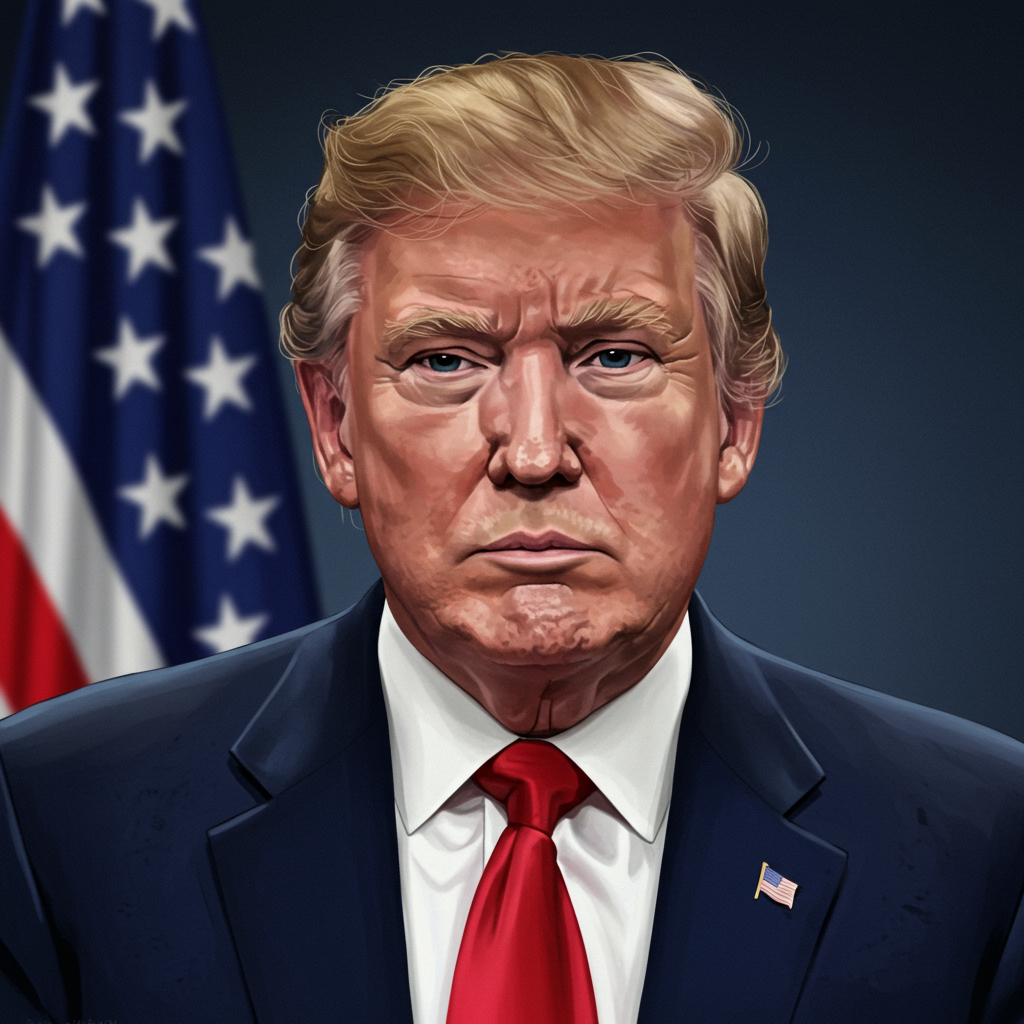In a move signaling the complex intersection of media, politics, and corporate strategy, Paramount Global, the parent company of CBS News, has agreed to pay $16 million to settle a contentious defamation lawsuit filed by former President Donald Trump. The settlement concludes a lengthy legal battle over a segment on the flagship news program “60 minutes.” Legal experts widely criticized Trump’s suit as groundless and potentially harmful to press freedom. However, corporate pressures appear to have influenced Paramount’s decision to resolve the matter.
This significant payment, announced late Tuesday night, will not go directly to Mr. Trump. Instead, mirroring a previous settlement involving Disney’s ABC News, the funds are earmarked for his future presidential library. Paramount has explicitly stated that the agreement includes no apology or admission of wrongdoing concerning the reporting or editing of the “60 Minutes” segment in question.
The Genesis of the Dispute: A “60 Minutes” Interview
The lawsuit originated from a specific segment aired in October 2024 on “60 Minutes.” During an interview with then-Vice President Kamala Harris conducted by correspondent Bill Whitaker, a particular exchange regarding her stance on dealing with Israeli Prime Minister Benjamin Netanyahu became the focal point of Trump’s complaint.
Trump alleged that the interview was deceptively edited. His team highlighted that a preview aired on “Face the Nation” featured a more convoluted sentence from Harris’s response. In contrast, the final “60 Minutes” broadcast included a seemingly more forceful or succinct part of the same answer. Trump claimed this editing was a deliberate attempt to make Harris appear more favorable and boost her electoral prospects ahead of the presidential election.
Trump initially sought a staggering $10 billion in damages, later increasing his demand to $20 billion. His lawsuit, filed in a Texas court presided over by a Trump-appointed judge, utilized the Texas Deceptive Trade Practices Act. This consumer law is typically aimed at false advertising, not journalistic content. He contended the edits constituted “malicious, deceptive, and substantial news distortion” and unlawful “election and voter interference,” causing him “mental anguish.” After winning the election, his revised suit also claimed harm because the edited interview allegedly diverted traffic from his media platforms like Truth Social.
Paramount’s Stance and Legal Defense
CBS News and Paramount consistently denied Trump’s serious allegations. They maintained that the editing practices used were standard in television news production and done simply for time constraints. CBS asserted that the unedited footage confirmed Harris was accurately quoted and that no nefarious activity occurred.
Throughout the legal process, CBS argued that journalistic edits and news judgment are protected by the First Amendment. They sought to move the case from the Texas venue to New York, where CBS and “60 Minutes” are based, believing it to be a more appropriate jurisdiction for a case involving national news reporting. Paramount’s lawyers characterized the suit as “meritless” in court filings, arguing that Trump had not demonstrated credible personal harm to a commercial interest.
Despite CBS’s strong defense and legal experts agreeing that the network was on solid ground to fight and likely win the case, corporate considerations introduced significant pressure to settle.
The Skydance Merger and FCC Influence
A major factor driving Paramount’s decision to settle was the pending $8 billion proposed sale to David Ellison’s Skydance Media. This complex transaction requires approval from the Federal Communications Commission (FCC). CBS owns local broadcast stations licensed by the government, giving the FCC regulatory oversight over such a merger.
Crucially, the Trump administration appointed FCC Chairman Brendan Carr. Carr opened an inquiry into whether the “60 Minutes” edits constituted “news distortion,” effectively holding up the merger review process. This occurred despite the FCC historically having limited authority over news accuracy or bias due to the First Amendment. While Carr repeatedly stated his merger review was separate from the lawsuit, before his promotion, he had indicated that complaints over the “60 Minutes” edit would likely arise during the FCC’s merger review.
This situation created a form of leverage, potentially putting more pressure on Paramount to resolve the lawsuit to facilitate the merger’s regulatory path. Shari Redstone, Paramount’s controlling shareholder, whose family firm faces significant debt, reportedly strongly pushed for a settlement to secure the funds the Skydance deal would provide. While a representative claimed she recused herself from lawsuit decisions, her desire for the settlement was known. Skydance executives also pressed for the issue to be resolved before the takeover, which faced an October deadline.
Internal Turmoil and Criticism
The potential settlement and the corporate maneuvering reportedly caused significant consternation within CBS News, particularly at “60 Minutes.” Some staffers felt the controversy could have been mitigated by releasing the interview transcript sooner.
The period leading up to the settlement saw notable leadership changes. Bill Owens, the executive producer of “60 Minutes,” resigned in April 2025, citing a loss of editorial independence due to increased corporate oversight aimed at appeasing Trump and securing FCC approval. Days later, longtime “60 Minutes” correspondent Scott Pelley publicly commented on the situation during a broadcast, revealing that executives had “began to supervise our content in new ways” amid the pending merger, stating, “No one here is happy about it.” In May, Wendy McMahon, then president and CEO of CBS News and Stations, also stepped down, alluding to a “challenging” few months and a disagreement with the company on the path forward.
Outside analysts and press freedom groups voiced strong criticism of Paramount’s decision to settle. They denounced the lawsuit as frivolous and the settlement talks as a “shake-down,” arguing that Paramount ceded valuable First Amendment ground rather than defending a “plainly winnable” case. The Freedom of the Press Foundation stated, “Everyone knows the case is not worth $20 million, or even 20 cents, in terms of legal merit.”
The Presidential Library Precedent
The structure of the settlement, directing funds to Mr. Trump’s future presidential library rather than directly to him, mirrors a previous agreement. In December 2024, Walt Disney Co. settled a defamation lawsuit brought by Trump against ABC News and anchor George Stephanopoulos, paying $1 million for legal fees and donating $15 million to his library. This suggests a pattern in how Trump’s legal actions against media companies are being resolved.
While Paramount is settling, other media outlets facing Trump’s legal challenges, such as Gannett’s Des Moines Register and the Associated Press, have chosen to vigorously defend themselves in court.
Broader Implications
The Paramount settlement, alongside other legal actions taken by Mr. Trump against media organizations, underscores concerns among experts. They worry that powerful figures may use government levers, like regulatory review, and aggressive legal strategies, including utilizing consumer protection laws, to intimidate and pressure media organizations. Critics argue this could chill journalistic scrutiny and set a concerning precedent for challenging news reporting outside of traditional defamation frameworks.
As part of the settlement, Paramount committed that, going forward, “60 Minutes” will release transcripts of interviews with eligible U.S. presidential candidates after they have aired. This commitment is subject to necessary redactions for legal or national security concerns. While increasing transparency is generally positive, critics note this concession stems from pressure applied through a legally questionable lawsuit.
The resolution of the “60 Minutes” lawsuit removes a significant roadblock for the Skydance merger. However, it highlights the tensions that can arise when corporate interests intersect with the principles of independent journalism and the challenges facing media outlets in navigating the current legal and political landscape.
Frequently Asked Questions
What specific editing allegations led to the Paramount/CBS lawsuit from Donald Trump?
The lawsuit stemmed from a “60 Minutes” interview with then-Vice President Kamala Harris. Trump alleged CBS deceptively edited Harris’s response to a question about dealing with Israel’s prime minister. He claimed a shorter, seemingly more coherent version of her answer was used in the “60 Minutes” broadcast compared to a longer version shown in a “Face the Nation” preview, suggesting it was edited to make Harris appear more favorable and boost her election prospects.
How did the Skydance merger reportedly influence Paramount’s decision to settle Trump’s lawsuit?
Paramount Global was pursuing an $8 billion merger with Skydance Media, which required FCC regulatory approval. The Trump-appointed FCC Chairman opened an inquiry into the “60 Minutes” editing claims, effectively stalling the merger review. While Paramount stated the lawsuit was separate, sources suggest the need to resolve this potential obstacle and secure FCC approval, coupled with pressure from the controlling shareholder needing the merger funds, significantly pressured Paramount to settle the lawsuit.
Where will the $16 million from the Paramount settlement with Donald Trump be allocated?
The settlement agreement stipulates that the $16 million paid by Paramount Global will not go directly to Donald Trump. Instead, the funds are designated for his future presidential library. This structure is similar to a previous settlement reached between Trump and Walt Disney Co. over a lawsuit against ABC News, where funds were also directed to the library.
Word Count Check: 1120
References
- www.latimes.com
- deadline.com
- www.thewrap.com
- <a href="https://www.imdb.com/news/ni65361410/?ref=nmnwr_1″>www.imdb.com
- www.dagens.com


